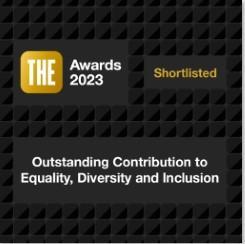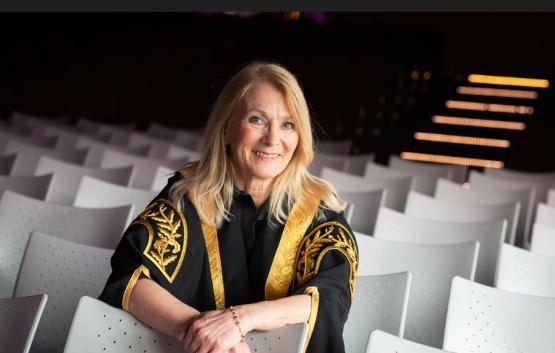University of Bradford shortlisted for THE Awards 2023

The University of Bradford has been shortlisted for this year’s Times Higher Education Awards for its outstanding contribution to equality, diversity and inclusion.
It was shortlisted for its Graduate Workforce Bradford (GWB) scheme, a three-year Office for Students-funded project, designed to address differential outcomes for Bradford’s ethnic minority graduates, who were significantly less likely to progress to a graduate job than their white peers.
The THE Awards - widely regarded as a ‘the Oscars’ of the higher education sector - will take place at the ACC in Liverpool on December 7. It is the first time they will have been held outside London.
Vice-Chancellor Professor Shirley Congdon, pictured below, said: “Time and again the University of Bradford is recognised for its exceptional work on improving equality, diversity and inclusion. Our shortlisting in this year’s Times Higher Education Awards shows our commitment to those principles is making a real difference to people’s lives, and that the university continues to be a beacon in this area.
“Graduate Workforce Bradford is a prime example of how our strategic commitment to EDI translates to the real world. Our vision is a world of inclusion and equality of opportunity, where people want to, and can, make a difference. We will be known as the place to be, to make that difference.”

A beacon for EDI
The University has twice been ranked #1 in England on the Social Mobility Index, and in 2019/20 was named University of the Year for Social Inclusion by The Times/Sunday Times. It has also won numerous other accolades for its work on improving equality, diversity and inclusion, including awards from Athena Swan, the Race Equality Council, Levelling Up awards, and more.
THE editor John Gill said: “19 years on from their launch, I’m delighted to say that the enthusiasm for the THE Awards continues to grow. This year saw yet another record number of entries, but maybe more importantly, we also have more institutions represented on the shortlists than ever before – a clear indicator of the great strength in depth of UK and Irish higher education.
“Across 19 categories, you will find not only some long-established big names, but also younger, aspirational institutions, those with a community-centred civic vision, and others with a much more specialist focus – all of whom deserve wider recognition for their brilliant work.
“Our awards are inclusive by design, and while THE has learned countless things over the past 52 years covering the sector, right up there is the fact that innovative and inspirational ideas can originate at any institution, whatever its shape, size or reputation.
“We’re incredibly proud to host this biggest celebration of the sector, and particularly excited this year by the prospect of taking the final ceremony on the road for the first time. The ACC in Liverpool awaits on 7 December, and the THE team are all looking forward to seeing everyone there, and toasting your success.”

About Graduate Workforce Bradford
Graduate Workforce Bradford (GWB), a three-year OfS-funded Challenge Competition project, was designed to address evidenced differential outcomes for Bradford’s ethnic minority graduates, who were significantly less likely to progress to a graduate job than their white peers.
GWB used an evidence-based approach to tackle a real-world problem by implementing specific, measurable and realistic goals. It far surpassed its goals, for example, a challenging target for ethnic minority graduate progression to high-skilled employment was exceeded by +70%.
It has also left a tangible legacy that continues to influence workplace practices and employment models today. It has also helped start a conversation about employment inequalities linked to race; and is helping challenged long-held taboos.
GWB’s impact and legacy demonstrates the power of partnership, delivering sustainable models of practice, contributing to ‘decolonising’ the careers and employment landscape, embedding inclusive recruitment practices, and influencing policymakers/commissioners of services for businesses and graduates.
